The 4 Cardinal Virtues are good in themselves but nevertheless insufficient. We are limited because we are creatures and because we suffer from Original Sin and, after Baptism, we still tend to commit Actual Sins.
In addition we were created and redeemed by God as a beings made of a body-soul unity. We are natural beings with a supernatural destiny.Â
Therefore, we need more than natural virtues. We need Grace and the 3 Theological Virtues.
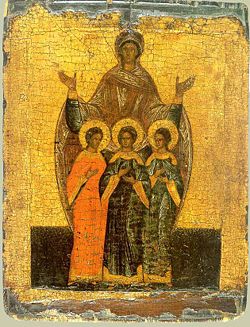
The Three Theological Virtues are Faith, Hope and Charity. They are necessary for our eternal salvation.Â
Unlike the natural virtues we could not have discovered these by natural reason because we needed Divine Revelation in order to learn about them. Also these virtues are not just attained through practice but infused by Grace at Baptism. We can see then that they are a sheer gift from God. Nevertheless, they remain true virtues and must be practiced and exercised.
The Theological Virtues have God - the Blessed Trinity - as their Origin, Motive and Object.
Grace builds on Nature.
The Theological Virtues build on the Cardinal Virtues and yet raise them to heights and fulfillment which they could never have attained before. Although all analogies are imperfect when speaking of Divine things, we could use the analogy of the champagne fountain to help us to understand this better.
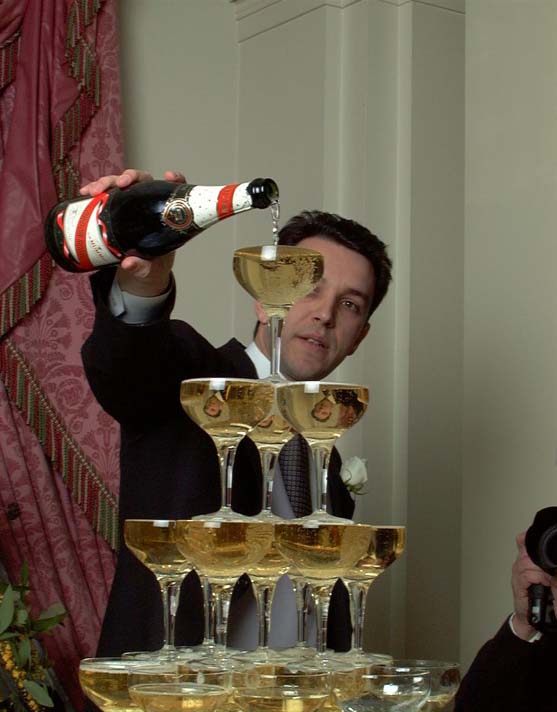
The higher glasses stand on the lower glasses. They cannot receive the champagne from above without them being present. As the higher glasses receive the bubbly from above they overflow with goodness to the lower glasses and these can overflow beyond as long as the champagne continues to flow!
The Theological Virtues stand on the Cardinal Virtues. If we refuse to practice the Cardinal Virtues we cannot grow in the Theological Virtues. We hinder the flow of Grace from above. As the Theological Virtues receive Grace from above they overflow with Divine life to the Cardinal Virtues and these can overflow beyond as long as the Grace continues to flow unimpeded.
As the Theological Virtues flow into the Cardinal virtues they raise them to a higher degree of perfection.
A mortal sin (a sin with grave matter, committed with full consent of the will and deliberation) cuts off this flow of Grace. If the serious sin is not against Faith or Hope these two can still remain but Charity would be lost. If this occurs Grace works through our Faith and Hope to call us back to repentance and sincere Sacramental Confession in order to be in the State of Grace. We are thus able to receive Holy Communion worthily and grow again in Grace.
Charity is the highest of all the virtues. 1 Corinthians 13;13 teaches, 'So faith, hope and charity abide, these three. But the greatest of these is charity.' Â
The model of Faith, Hope and Charity par excellence is Our Lady, the Mother of God. We need her help in our living out of these virtues.
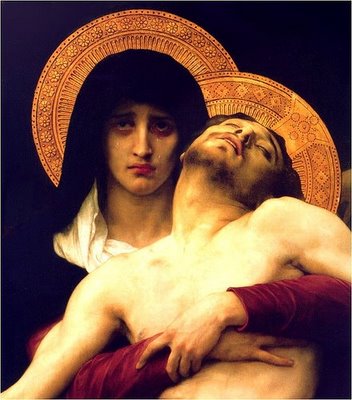
By cooperating with God's Grace she maintained Faith, Hope and Charity through all the joys of sufferings which She shared with our Divine Saviour.
Catechism CCC 1814: Faith is the theological virtue by which we believe in God and all that He has said and revealed to us and that Holy Church proposes for our belief, because He is Truth itself.
CCC 1817: Hope is the theological virtue by which we desire the kingdom of heaven and eternal life as our happiness, placing our trust in Christ's promises and relying not on our own strength, but on the help and grace of the Holy Spirit.
CCC 1822: Charity is the theological virtue by which we love God above all things for His own sake, and our neighbour as ourselves for the love of God.
This leads us to consider the Priority of Grace in the Christian moral life. This refers to the fact that we cannot be holy on our own strength. If we try we will fail and become miserable. We will also start looking down on sinners like the Pharisee against the Publican in Luke Chapter 18.
This will not bring us freedom or help to restore virtue to our culture.
Instead we are to think of the moral life of the Christian as the New Life in Jesus Christ. It is always a case of accepting oneself as a sinful beggar standing empty handed before the Grace of God. He lavishes this Grace upon us superabundantly although we do not deserve it and He does not have to give it to us. It is sheer and unmerited gift.
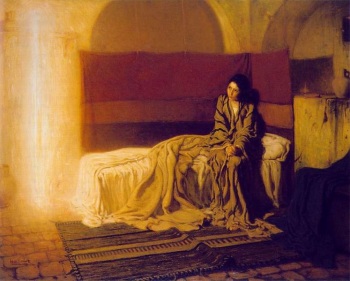
The very structure of the Catechism of the Catholic Church underscores this Priority of Grace by focusing on Who God is and what He chooses to do for us in Parts 1 and 2. It is not until Parts 3 and 4 that our response is dealt with in terms of the moral life and the life of prayer respectively.Â
To maintain a healthy balance we recalled that the Priority of Grace does not leave us passive. The life of virtue is firstly a gift but it is also a task. And it is a demanding task lasting the whole of life.
Leo Tolstoy once said that it was better to practice one virtue to perfection than to write 20 volumes of philosophy. He added that it was easier to write 20 volumes of philosophy than to practice one virtue to perfection...
To fully inoculate us from the idea that we can be virtuous by our own strength we considered the 7 Deadly sins of Covetousness, Envy, Sloth, Gluttony, Lust, Anger and Pride.Â
Fr. Vivian Boland OP has written a helpful CTS booklet called 8 Deadly Sins - Learning to Defend the Life of Grace, which deals with this subject (he lists 8 because he distinguishes Pride from Vainglory). Fr. Boland notes that if our parish communities are not struggling with these sins it does not necessarily mean that we have become holy... on the contrary it may suggest that we have given up fighting against them!Â
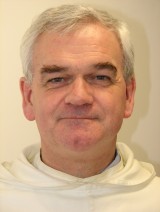
Fr. Vivian Boland OP
Having considered how deep the roots of these vices can be found in all of us we noted how much we must depend on Grace to free us from sin and lead us in the life of virtue.
The second talk concluded by recalling that we are called to holiness. This means we are invited to respond to God's gift of Grace by working with Him to become saints. Nothing less than this will be enough. This is especially so in these times of grave moral confusion when we must be the lights shining in the darkness. More than ever Christians need to give off the aroma of Christ. Will we respond to God's offer of Grace by co-operating with a virtuous life and handing on this good news to others? Hopefully we will.

The participants were invited to begin each new day by kneeling down next to their beds in childlike trust and doing the following three things:-
1. To thank God for the gift of Faith, Hope and Charity.
2. To ask Him to preserve and increase them in us.
3. To bestow them upon our families, friends, neighbours, colleagues and enemies.
If we do this we are assured that God will lavish His Grace upon us and assist us in our practice and teaching of the virtues.



